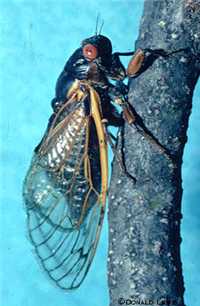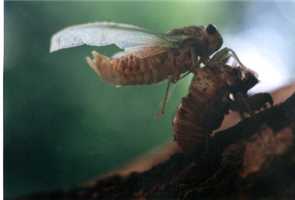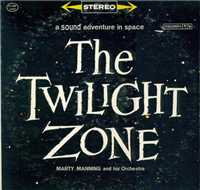
(Matthew 16:13-23)
May these words of this Peter be like a rock,
not a stumbling block!
|
|
"Who do you say
that I am?" Jesus asked. Simon Peter answered, "You
are the Messiah, the Son of the living God." And Jesus
answered, "Blessed are you, Simon son of Jonah! ... You are
Peter (petros), and on this rock (petra)
I will build my church..." Jesus then began to speak of
the rough road ahead. And Peter took him aside and rebuked him... "Get
behind me, Satan!" Jesus replied. "You are a stumbling
block..." (Matthew 16:13-23) May these words of this Peter be like a rock, |
"And they spring to life"
Message preached May 30,
2004
Long Green Valley Church of the Brethren
Glen Arm, Maryland USA
based upon Psalm
104:24-35
"When you (O Lord) send forth your spirit, they are created, and you renew the face of the ground" (NRSV, NIV). So sang the Psalmist in a hymn to the Creator. Or, as another take on this scripture puts it, "Send out your Spirit, and they spring to life..." (The Message)
Weíre in
the middle of a majestic season of Godís creatures springing to life. No, Iím
not referring to the time of year we face on an annual basis, when "the
whole countryside" is "in bloom and blossom," though
the season of Spring surely fits this portion of Psalm 104. However, thatís
not what Iím thinking about right now. The majestic season to which I am
referring has to do with something we havenít seen happen in seventeen years.
referring to the time of year we face on an annual basis, when "the
whole countryside" is "in bloom and blossom," though
the season of Spring surely fits this portion of Psalm 104. However, thatís
not what Iím thinking about right now. The majestic season to which I am
referring has to do with something we havenít seen happen in seventeen years.
What is it that causes the Cicada, the particular brand of which is found only in this particular neck of the woods, to spring to life on a clockwork basis every seventeen years? Iím no scientist. Perhaps youíve read more on this question than I have - which, I confess, isnít all that much. I pondered it recently with Margaret Bayless as we sat on her back yard bench, watching an abundance of those little creatures doing what they do in her trees.
Those of
you who have been entertaining these bugs on your property might struggle to
think of it as a "majestic" season. Maybe anything but. The noise can
almost be deafening.  Fortunately, they eventually shut up at night. Their shells
can litter the ground, as will their bodies all-too-soon. And their flight? Itís
more like controlled falling. In some cases you even wonder about the
"controlled" part, as they "fly" into your car when stopped
at a light. Furthermore, there seems to be little choice in whether or not they
visit you. Some locations are thick with them, while others seem to have very
few. Go figure!
Fortunately, they eventually shut up at night. Their shells
can litter the ground, as will their bodies all-too-soon. And their flight? Itís
more like controlled falling. In some cases you even wonder about the
"controlled" part, as they "fly" into your car when stopped
at a light. Furthermore, there seems to be little choice in whether or not they
visit you. Some locations are thick with them, while others seem to have very
few. Go figure!
Iím sure there is a scientific reason why these creatures pop out of the ground, break out of their shell, and madly jump into their obsessive mating ritual every seventeen years. Even if I did come across a good explanation (and Iím sure one of you will probably enlighten me in the coming week), Iím not sure it will satisfy. Truly, I prefer the poetry of the psalmist. "When thou breathest into them, they recover; thou givest new life to the earth" (NEB). It is the very breath of God which renews the face of the ground with the wonder of the Cicada...
This
weekend brought forth yet another season in my little corner of the land, one
which many others have been, are presently, or will soon
face. Yesterday our oldest child graduated from high school. Interestingly, a
comparison with the  Cicada is not altogether inappropriate. Think about it. Some
of this yearís seniors are seventeen years old, though most have probably
crossed that magic line which makes them now an "adult" (at least on
paper). This is their moment for breaking out of their shell, so to speak, and
spreading their wings.
Cicada is not altogether inappropriate. Think about it. Some
of this yearís seniors are seventeen years old, though most have probably
crossed that magic line which makes them now an "adult" (at least on
paper). This is their moment for breaking out of their shell, so to speak, and
spreading their wings.
Of course, those of us of older years may wonder if it isnít a bit more like controlled falling. Or uncontrolled. The sound? Isnít it usually the case that what older ears hear behold as noise (perhaps sometimes even deafening), younger ears find appealing? When it comes to choices to be made, by now this responsibility has (for the most part) been handed from older to younger. This is a season parents both desire and dread, when you live by faith, trusting that what has been passed on has taken root in a young adultís heart as she or he enters the world, full of all its siren calls. All too quickly, it seems, this season will be over...
"When you (O Lord) send forth your spirit, they are created, and you renew the face of the ground." So sang the Psalmist in a majestic hymn to the Creator. "Send out your Spirit, and they spring to life..." From early on, the church of Jesus Christ has linked this scripture to the celebration of Pentecost. This may seem strange at first glance. After all, Psalm 104 speaks of nature, whereas Pentecost - as Iíve hear some describe it - is about super-nature, that is something beyond the natural realm. On that birth-day of the church, believers were endowed with so-called "supernatural" gifts as the very presence of God was breathed into them.
I confess
that Iíve always found it difficult to swallow this word
"supernatural." It probably goes back to my days as the youngest of
three siblings, when I was forbidden to watch such television shows as "The
Outer Limits" because they gave me nightmare s. When my folks went away, can
you guess what my sisters watched with the door shut so I couldnít enter? I
could still hear, though, and my imagination was probably better than that old
black and white TV set. "Supernatural" was frightening stuff, full of
all sorts of spectral images. To this day, I am not a big fan of calling Godís
Spirit the "Holy Ghost." Too many connotations there.
s. When my folks went away, can
you guess what my sisters watched with the door shut so I couldnít enter? I
could still hear, though, and my imagination was probably better than that old
black and white TV set. "Supernatural" was frightening stuff, full of
all sorts of spectral images. To this day, I am not a big fan of calling Godís
Spirit the "Holy Ghost." Too many connotations there.
Granted, if we read the story of Pentecost in a certain way, it could be heard as scarey. An awesome wind blowing through a room (sounds almost haunted), tongues of fire on each person, people then babbling on in words only some understand. It doesnít take much imagination to figure out why folks on the outside might be a bit cautious. "What does this mean?"
I believe one reason why the church linked Psalm 104 with the celebration of Pentecost was to make the connection between what God did (and continues to do) in creating and sustaining the natural world, and what God did (and continues to do) in creating and sustaining the church. "If anyone is in Christ," the apostle Paul once wrote, "there is a new creation: everything old has passed away; see, everything has become new!" (2 Corinthians 5:17). "When you (O Lord) send forth your spirit, they are created, and you renew the face of the ground." So sang the Psalmist in a majestic hymn to the Creator. When the early followers of Jesus heard those words they thought of the new creation, and how God was renewing the face of the earth before their own eyes. And with the Psalmist they sang, "Send out your Spirit, and they spring to life..."
This isnít so much a matter of being above and beyond nature, of being "supernatural." In reality it is what the Creator has intended all along. "We know," Paul wrote long ago to the believers in Rome; "We know that the whole creation has been groaning in labor pains until now; and not only the creation, but we ourselves, who have the first fruits of the Spirit, groan inwardly while we wait for adoption, the redemption of our bodies" (Romans 8:22-23).
The Cicada comes back to mind. Again, I have no idea why the life cycle of this creature involves seventeen years underground in a larval state, before it reaches the surface and has its day in the sun. But, you know, in some ways we are a bit like that insect. Now donít go and tell people that "Pastor Pete called us all a bunch of bugs." There is, though, some truth to that - human nature being what is. The off-the-wall cartoonist Gary Larson was so popular because he was (as is) able to make that connection in looking at things from "The Other Side." People are like insects. But thatís not really what Iím talking about.
We are
kind of like the Cicada, which is currently bugging the daylights out of many
folks this month. Our life before Christ, before God breathes his Spirit into
us, is like being in a shell, underground. There comes a moment for us to break
out of that shell and become what God created us to truly be. That, my friends,
is Pentecost. Unlike the Cicada, however, we arenít locked into a seventeen
year cycle, a "cicadian" (not to be confused with
"circadian") rhythm which places most of our life in the dark and damp
with only a relatively few moments in the light. Of course, many people are
satisfied w ith such a life. They like the shell.
ith such a life. They like the shell.
However, there is so much more in store for those who break out and step into Godís eternal rhythm of re-creation. "Send out your Spirit (O Lord), and (we) spring to life..." Just as Pentecost is not some scarey story that takes place in "The Outer Limits" or "Twilight Zone" of past nightmares, it also is not relegated to one particular moment in time long ago. Itís not a supernatural ghost story, nor is it only referred to in the past tense. In Pentecost, as we have appropriated this ancient Jewish harvest festival (a celebration, by the way, of Godís gift of nature in the planting and reaping life cycle); in Pentecost we recognize and rejoice in the very breath of God that is within us now.
The Holy
Spirit, you see, is not a ghost to haunt us. Rather, it is the very presence of
God within us and around us, which powers us to - if you will - spread our wings
and fly. Faith is thus not some intellectual exercise. It involves depending
upon the wind beneath our wings. That wind is God, blowing though us - inside
and out. Now, Iíll grant you that sometimes our journey with Jesus, depending
as we do upon the presence of the Holy Spirit, can feel a bit like controlled
falling - especially when we encounter difficulties along the way. That,
however,  is what makes faith ... well ... faith. It takes a lot of trust to step
off a branch. Look at the Cicada.
is what makes faith ... well ... faith. It takes a lot of trust to step
off a branch. Look at the Cicada.
Thatís what the church did on the first Pentecost. Yes, it was a birthday, but it was also a graduation, as the followers of Jesus stepped off the branch, so to speak, and started flying. Imagine, there was this guy Peter who had earlier fallen like a rock when he tried to fly with Jesus on the night when our Lord was betrayed. Three times this common fisherman messed up. And yet, on that graduation day called Pentecost this "rock," filled with the Spirit, spread his wings and flew. He was the commencement speaker, if you will - the most unpredicted Valedictorian ever. When the question "What does this mean?" was asked, he stepped up and answered. And the church took off. "Send out your Spirit (O Lord), and (we) spring to life..."
As we sing our next hymn, allow the very act of breathing (without which you couldnít lift your voice in praise) to remind you of Godís presence in the Holy Spirit. Donít wait seventeen years to break out of your shell. God has sent out His Spirit. Spring to life. Let this be your birthday. Let this be your graduation day. Amen?
| online resources for this scripture text |
For commentaries consulted, see Psalms. |
©2004 Peter
L. Haynes
(you are welcome to borrow and, where / as appropriate, note
the source - myself or those from whom I have knowingly borrowed.)